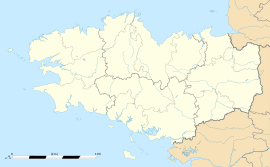Molène
Île-Molène
Molenez | |
|---|---|
 A general view of Molène | |
show Location of Île-Molène | |
 Île-Molène | |
| Coordinates: 48°23′50″N 4°57′20″W / 48.3972°N 4.9556°WCoordinates: 48°23′50″N 4°57′20″W / 48.3972°N 4.9556°W | |
| Country | France |
| Region | Brittany |
| Department | Finistère |
| Arrondissement | Brest |
| Canton | Saint-Renan |
| Intercommunality | Pays d'Iroise |
| Government | |
| • Mayor (2014–2020) | Daniel Masson |
| Area 1 | 0.75 km2 (0.29 sq mi) |
| Population (2017)[1] | 141 |
| • Density | 190/km2 (490/sq mi) |
| Time zone | UTC+01:00 (CET) |
| • Summer (DST) | UTC+02:00 (CEST) |
| INSEE/Postal code | 29084 /29259 |
| Elevation | 0–26 m (0–85 ft) |
| 1 French Land Register data, which excludes lakes, ponds, glaciers > 1 km2 (0.386 sq mi or 247 acres) and river estuaries. | |
Molène (Breton: Molenez) is an island off the west coast of Brittany and one of the Ponant Isles, making it the largest of an archipelago of twenty islands. In tiers of government it is in Finistère, a department of Brittany in north-western France – specifically at the heart of the commune of Île-Molène, which takes in neighbouring islets.
Geography[]
The island is small, less than 1 by 0.9 km (0.56 mi), and covers under 75 hectares (190 acres) of non-foreshore land. The community and port are on the east side, opposite a tiny tidal island, the Lédénes of Molène.
Population[]
Inhabitants of Île-Molène are called in French Molénais. Usual residents have fallen in recent decades, but Molène remains inhabited, with a permanent population of 169 (2013 census).
| Year | Pop. | ±% |
|---|---|---|
| 1962 | 596 | — |
| 1968 | 527 | −11.6% |
| 1975 | 397 | −24.7% |
| 1982 | 330 | −16.9% |
| 1990 | 277 | −16.1% |
| 1999 | 264 | −4.7% |
| 2008 | 214 | −18.9% |
| 2013 | 169 | −21.0% |
Amenities[]
The island's electricity is produced by a small diesel generator. Potable water supplies are from rainwater catchment, with each household additionally maintaining its own cistern.
A local delicacy is Molène sausage, which has the distinction of being smoked with seaweed.
Wreckage history[]
Per a repetitive old Breton proverb, "Qui voit Molène voit sa peine / Qui voit Ouessant voit son sang / Qui voit Sein voit sa fin / Qui voit Groix voit sa croix." ("Who sees Molène sees his pain/penalty / who sees Ushant sees his blood / who sees Sein sees his end / who sees Groix sees his cross"). This proverb underlines local points being often deadly to navigate.
See also[]
References[]
External links[]
| Wikimedia Commons has media related to Molène. |
| Wikimedia Commons has media related to Archipel de Molène. |
| Wikivoyage has a travel guide for Molène. |
- Official website (in French)
- Base Mérimée: Search for heritage in the commune, Ministère français de la Culture. (in French)
- Islands of Brittany
- Communes of Finistère
- Finistère geography stubs


